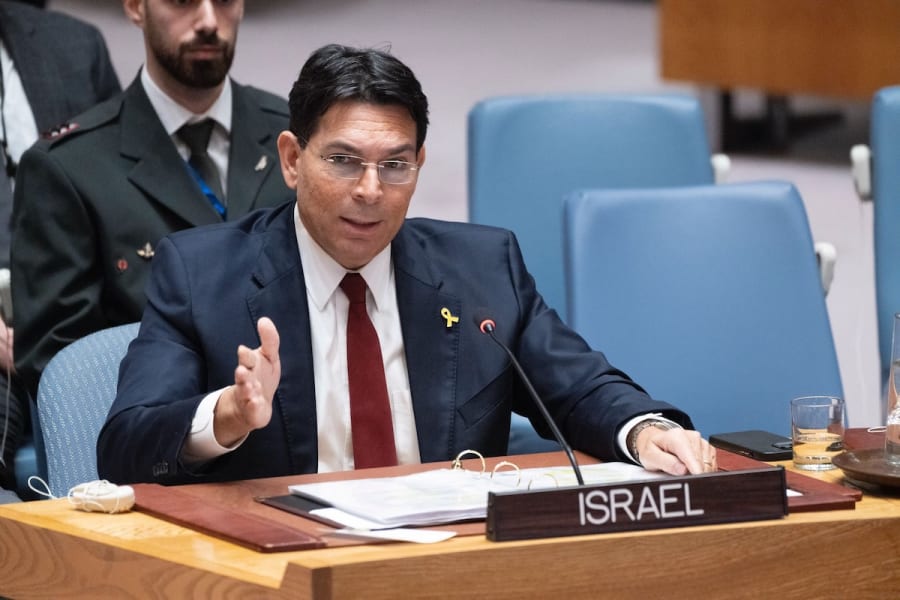'A nuclear Iran would have been a death sentence' - Israeli UN ambassador defends attacks on Iranian nuclear sites

Israeli UN Ambassador Danny Danon praised on Sunday the Trump administration’s decision to bomb Iran’s main nuclear facilities Fordo, Natanz and Isfahan. He told the UN Security Council members that Israel and the U.S. acted in self-defense after years of diplomacy failed to block the Iranian regime’s quest for nuclear weapons.
“This is what the last line of defense looks like when every other line has failed,” Danon assessed.
“The cost of inaction would have been catastrophic. A nuclear Iran would have been a death sentence just as much for you as it would have been for us,” the Israeli ambassador warned.
Prior to the Israeli and American strikes, it was believed that the Iranian regime had enough close to weapons-grade enriched uranium to build between 10 to 15 nuclear bombs.
Danon also blasted the Islamic regime for using negotiations with the U.S. and European countries as a cover to buy time to complete its uranium enrichment and expansion of its missile arsenal.
The Iranian UN envoy Amir Saeid Iravani claimed that Washington and Jerusalem were destroying diplomacy and denied all charges that Tehran seeks nuclear weapons. Iravani claimed that the nuclear non-proliferation treaty “has been manipulated into a political weapon.”
“Instead of guaranteeing parties' legitimate rights to peaceful nuclear energy, it has been exploited as a pretext for aggression and unlawful action that jeopardize the supreme interests of my country,” the Iranian ambassador claimed.
The Russian UN Ambassador Vassily Nebenzia mocked the U.S. by dismissing concerns about Iranian nuclear weapons as “fairy tales.”
“Again we're being asked to believe the US's fairy tales, to once again inflict suffering on millions of people living in the Middle East. This cements our conviction that history has taught our US colleagues nothing” Nebenzia stated, referring to former U.S. Secretary of State Colin Powell’s warning in 2003 that the Iraqi dictator Saddam Hussein had stockpiles of biological and chemical weapons that threatened world peace.
UN Secretary-General Antonio Guterres also criticized Washington’s decision to bomb Iran’s nuclear facilities.
“The bombing of Iranian nuclear facilities by the United States marks a perilous turn,” Guterres said. “We must act – immediately and decisively – to halt the fighting and return to serious, sustained negotiations on the Iran nuclear program,” he added.
China’s UN envoy Fu Cong argued that the conflicts in the Middle East could only be resolved through diplomacy.
“Peace in the Middle East cannot be achieved by the use of force,” Cong argued. “Diplomatic means to address the Iranian nuclear issue haven't been exhausted, and there's still hope for a peaceful solution,” he added.
However, acting U.S. Ambassador to the UN Dorothy Shea emphasized that Washington was forced to use military force after Tehran refused to dismantle its nuclear program through peaceful diplomacy.
“Iran long obfuscated its nuclear weapons program and stonewalled our good-faith efforts in recent negotiations,” Shea stated. “The Iranian regime cannot have a nuclear weapon,” she emphasized.
While the United Kingdom backed Washington’s military action against Iran, London’s UN Ambassador Barbara Woodward argued that military operations had to be complemented with diplomacy.
“Military action alone cannot bring a durable solution to concerns about Iran's nuclear program,” Woodward stated.
“We urge Iran now to show restraint, and we urge all parties to return to the negotiating table and find a diplomatic solution which stops further escalation and brings this crisis to an end,” the British ambassador concluded.

The All Israel News Staff is a team of journalists in Israel.













